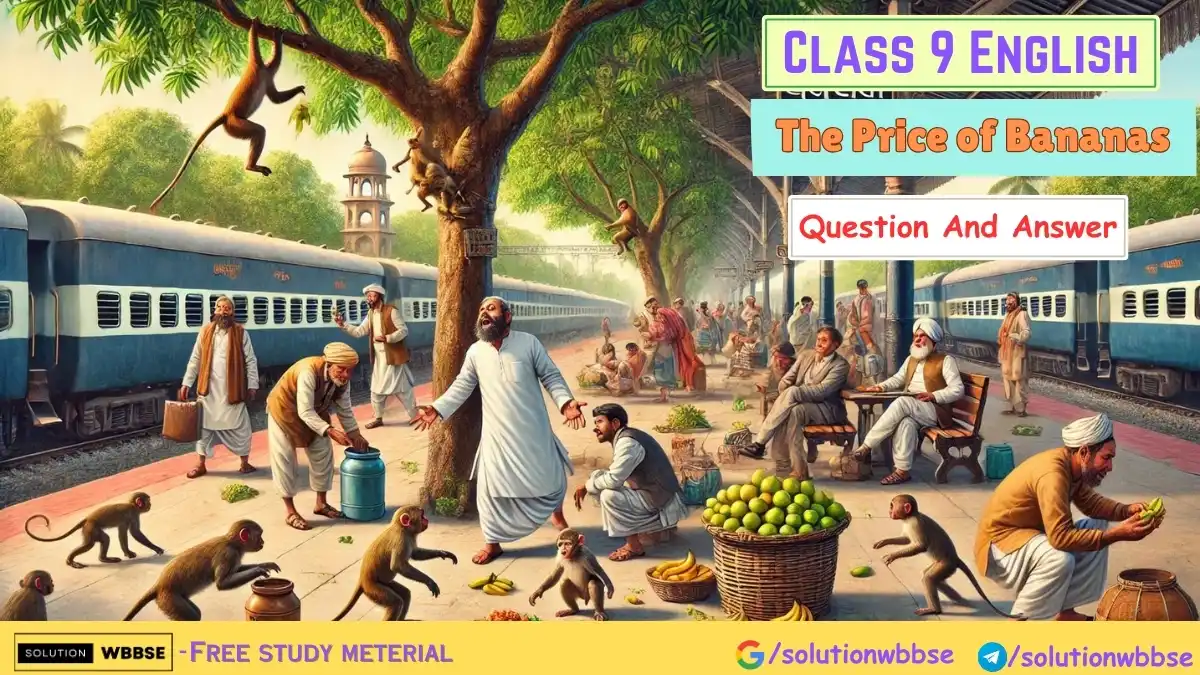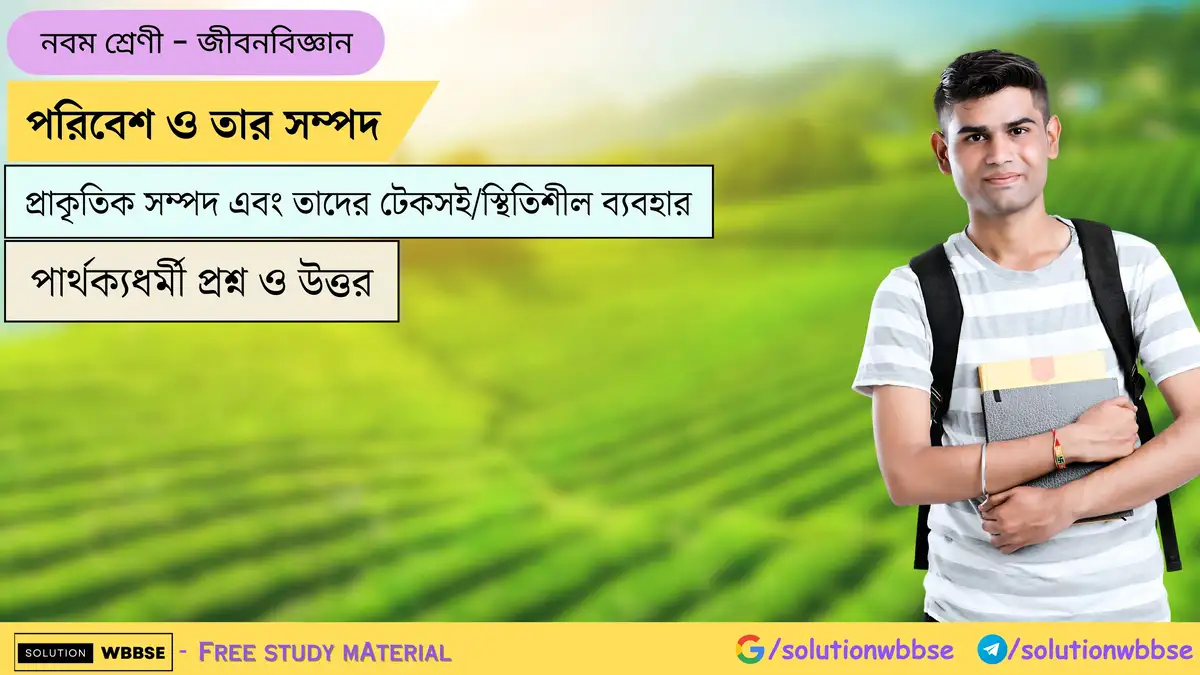আজকের আর্টিকেলে আমরা নবম শ্রেণীর ইংরেজির দশম অধ্যায় “The Price of Bananas” এর কিছু সংক্ষিপ্ত প্রশ্ন-উত্তর নিয়ে আলোচনা করবো। এই প্রশ্নগুলো নবম শ্রেণীর পরীক্ষার প্রস্তুতির জন্য অত্যন্ত গুরুত্বপূর্ণ। কারণ, এই প্রশ্নগুলো নবম শ্রেণীর পরীক্ষায় প্রায়ই দেখা যায়।

The Price of Bananas-এর Short Answer Type Questions
The author was going from Faizabad railway station to Lucknow. (লেখক ফৈজাবাদ রেলস্টেশন থেকে লখনউ যাচ্ছিলেন।)
When did he arrive at the station? (তিনি কখন স্টেশনে এসেছিলেন?)
The author arrived at the Faizabad railway station half an hour in advance of the time for the train’s departure. (লেখক ফৈজাবাদ রেলস্টেশনে ট্রেন ছাড়ার সময়ের আধ ঘণ্টা আগে এসেছিলেন।)
What was he doing at the station? (স্টেশনে তিনি কী করছিলেন?)
The author sat on a bench watching the monkeys frolicking on the trees. (লেখক একটি বেঞ্চে বসে গাছে বাঁদরদের খেলাধুলো দেখছিলেন।)
What were the monkeys doing? (বাঁদররা কী করছিল?)
The monkeys were playing happily on the trees and on the open platform. They were collecting mango-stones and food remains. (বাঁদররা আনন্দে গাছ এবং খোলা প্ল্যাটফর্মে খেলছিল। তারা আমের আঁটি এবং খাবারের উচ্ছিষ্ট সংগ্রহ করছিল।)
Where did the young monkeys sit? (বাচ্চা বাঁদরগুলো কোথায় বসেছিল?)
The younger monkeys sat on the boughs of the neem and tamarind trees. (বাচ্চা বাঁদরগুলো নিম ও তেঁতুলগাছের ডালে বসেছিল।)
What did the monkey do to the loin cloth of the pious person? (বাঁদরটি সাধুর কৌপীন নিয়ে কী করেছিল?)
The monkey took away the loin cloth of the pious person and went up the neem tree. (বাঁদরটি সাধুর কৌপীন নিয়ে নিমগাছের মাথায় উঠে গিয়েছিল।)
What did Sethji’s luggage include? (শেঠজির মালপত্রের মধ্যে কী ছিল?)
Sethji’s luggage included a big steel trunk, several small baskets, and a brass jug. (শেঠজির মালপত্রের মধ্যে ছিল একটি বড়ো ইস্পাতের তোরঙ্গ, অনেকগুলি ছোটো ঝুড়ি এবং একটি পিতলের জগ।)
How was the train’s arrival announced? (ট্রেনের আগমন কীভাবে ঘোষণা করা হয়েছিল?)
The train’s arrival was announced by the ringing of the station bell. (ট্রেনের আগমন স্টেশনের ঘণ্টা বাজিয়ে ঘোষণা করা হয়েছিল।)
On hearing the announcement, the author concentrated on securing a seat in the train for himself. (ঘোষণা শুনে লেখক ট্রেনে নিজের জন্য একটি আসন সুরক্ষিত করার দিকে মনোনিবেশ করেছিলেন।)
Where did he find a seat in the train? (তিনি ট্রেনে কোথায় আসন খুঁজে পেয়েছিলেন?)
The author got a seat by the window overlooking the platform. (লেখক জানালার ধারে একটি আসন পেয়েছিলেন যেখান থেকে প্ল্যাটফর্ম দেখা যায়।)
Why were the passengers sweating? (কেন যাত্রীরা ঘামছিল?)
It was a hot summer day. So all the passengers were sweating. (সেদিনটি ছিল গ্রীষ্মের এক গরম দিন। তাই যাত্রীরা ঘামছিল।)
What were some passengers doing? (কিছু যাত্রী কী করছিলেন?)
Some passengers were filling up their small earthen pitchers from a water pump. (কিছু যাত্রী একটি জলের পাম্প থেকে তাদের ছোটো মাটির কলসি ভরছিলেন।)
What was the pious person doing? (সাধুটি কী করছিলেন?)
The pious person was taking a bath under the water pump on the platform. (সাধুটি প্ল্যাটফর্মে জলের পাম্পের তলায় স্নান করছিলেন।)
When the pious man requested the monkey to return his loin cloth, it returned the cloth, so, the author called it generous. (যখন সাধু বাঁদরকে তার কৌপীন ফেরত দিতে বললেন, সে কাপড়টি ফেরত দিয়েছিল। তাই লেখক তাকে উদার বলেছিলেন।)
Where did the monkey throw the loin cloth? (বাঁদর কোথায় কৌপীন ছুঁড়ে দিয়েছিল?)
The monkey threw the loin cloth down from the neem tree at the man’s feet. (বাঁদর নিমগাছ থেকে লোকটির পায়ের কাছে কৌপীন ছুঁড়ে দিয়েছিল।)
How was the businessman dressed? (ব্যবসায়ী কী পরেছিলেন?)
The businessman was dressed in a white muslin dhoti, a delicate tunic, and an embroidered cap on his head. (ব্যবসায়ী একটি সাদা মসলিনের ধুতি, একটি সূক্ষ্ম ফতুয়া এবং মাথায় একটি এম্ব্রয়ডারি করা টুপি পরেছিলেন।)
How did the monkey snatch away the cap from Sethji’s head? (কীভাবে বাঁদর শেঠজির মাথা থেকে টুপি ছিনিয়ে নিয়েছিল?)
Suddenly, the monkey leapt down from the top of the train compartment and snatched away the fine cap of Sethji. (আচমকা বাঁদর ট্রেনের কামরার উপর থেকে লাফিয়ে নেমে শেঠজির সূক্ষ্ম টুপিটি ছিনিয়ে নিয়েছিল।)
When the monkey snatched away his cap, how did the businessman react? (যখন বাঁদর টুপিটি ছিনিয়ে নিয়ে চলে গিয়েছিল তখন ব্যবসায়ী কী করেছিলেন?)
The businessman became confused. He shouted at the highest pitch and ran towards the monkey to get his cap back. (ব্যবসায়ী হতভম্ব হয়ে গিয়েছিলেন। তিনি উচ্চস্বরে চিৎকার করে টুপিটি ফেরত পাওয়ার জন্য বাঁদরের পিছনে ছুটেছিলেন।)
Who came forward to help Sethji? (কে শেঠজিকে সাহায্য করতে এগিয়ে এসেছিল?)
A fruit hawker came forward, pushing his little cart on the platform to help Sethji. (একজন ফল বিক্রেতা নিজের ছোটো ঠেলাগাড়ি নিয়ে শেঠজিকে সাহায্য করতে প্ল্যাটফর্মে এগিয়ে এসেছিল।)
What plan did the vendor make to get back the cap? (ফল বিক্রেতা টুপি ফিরে পাওয়ার জন্য কী পরিকল্পনা করেছিল?)
The vendor planned to politely coax the monkey and get back the cap. (ফল বিক্রেতা বাঁদরটাকে নম্র ভাষায় বাগে এনে টুপিটা ফেরত নেওয়ার পরিকল্পনা করেছিল।)
How did the vendor coax the monkey? (কীভাবে ফল বিক্রেতা বাঁদরকে মানিয়েছিল?)
The vendor coaxed the monkey by offering him a couple of bananas. (ফল বিক্রেতা বাঁদরকে কয়েকটি কলা দিয়ে মানিয়েছিল।)
How did the monkey respond to the call of the fruit seller? (ফল বিক্রেতার ডাকে বাঁদরটি কীভাবে সাড়া দিয়েছিল?)
The monkey climbed down cautiously to a branch near the vendor, took the bananas, and returned the cap. (বাঁদরটি সাবধানে নেমে ফল বিক্রেতার কাছে গিয়েছিল, কলা নিয়েছিল এবং টুপিটি ফেরত দিয়েছিল।)
Why, according to the fruit vendor, were the monkeys disturbing the passengers? (ফল বিক্রেতার মতে, কেন বাঁদরগুলি যাত্রীদের বিরক্ত করছিল?)
According to the fruit vendor, the monkeys were disturbing the passengers because they were hungry. (ফল বিক্রেতার মতে, বাঁদরগুলি যাত্রীদের বিরক্ত করছিল কারণ তারা ক্ষুধার্ত ছিল।)
What did the rest of the compartment request to Sethji? (কামরার বাকি যাত্রীরা শেঠজিকে কী অনুরোধ করেছিল?)
The rest of the compartment felt sympathy for the poor fruit hawker. So they requested Sethji to pay him two annas. (কামরার বাকি যাত্রীরা গরিব ফল বিক্রেতার প্রতি সহানুভূতি অনুভব করেছিলেন। তাই তারা শেঠজিকে দু আনা দিতে অনুরোধ করেছিলেন।)
How much annas did the vendor demand from Sethji? (ফল বিক্রেতা শেঠজির থেকে কত আনা চেয়েছিল?)
The fruit vendor demanded only two annas as the price of the bananas from Sethji. (ফল বিক্রেতা শেঠজির থেকে কলার দাম হিসেবে মাত্র দু আনা চেয়েছিল।)
How much did Sethji give to the porter and the fruit hawker? (শেঠজি কুলিকে ও ফল বিক্রেতাকে কত আনা করে দিয়েছিলেন?)
Sethji gave four annas to the porter and threw an anna towards the fruit vendor. (শেঠজি কুলিকে দিয়েছিলেন চার আনা এবং ফল বিক্রেতার দিকে এক আনা ছুঁড়ে দিয়েছিলেন।)
What is the meaning of the word ‘crook’? Whom did Sethji call a crook and why? (ক্রুক শব্দটির অর্থ কী? কাকে শেঠজি ক্রুক বলেছিলেন এবং কেন?)
The meaning of the word ‘crook’ is a dishonest person. Sethji called the porter a crook because he wanted more than four annas. (ক্রুক শব্দটির অর্থ অসৎ লোক। শেঠজি কুলিকে ক্রুক বলেছিলেন কারণ সে চার আনার থেকে বেশি চেয়েছিল।)
What did the fruit vendor do when the train began to move? (ট্রেন চলতে শুরু করলে ফল বিক্রেতা কী করেছিল?)
When the train began to move, the fruit vendor started running along with it and then got onto the footboard. (যখন ট্রেন চলতে শুরু করল, ফল বিক্রেতা তার সঙ্গে দৌড়াতে আরম্ভ করল এবং তারপর ট্রেনের পাদানিতে উঠে দাঁড়াল।)
What did Sethji do when the vendor started running along with the train? (শেঠজি কী করেছিলেন যখন ফল বিক্রেতা ট্রেনের সঙ্গে দৌড়তে শুরু করেছিল?)
When the vendor ran along with the train, Sethji turned his head away from him on the other side at the goods train. (যখন ফল বিক্রেতা ট্রেনের সঙ্গে দৌড়াতে শুরু করল, শেঠজি তাঁর মুখ সেদিক থেকে সরিয়ে নিয়ে মালগাড়ির দিকে তাকালেন।)
How did Sethji try to justify his deed? (কীভাবে শেঠজি নিজের কীর্তির সাফাই দিতে চেয়েছিলেন?)
Sethji tried to justify his deed by saying that the fruit vendor should not have offered the monkey the bananas if he did not want to. After all, nobody requested him to help. (শেঠজি নিজের কীর্তির সাফাই দিয়েছিলেন এই বলে যে ফল বিক্রেতার উচিত ছিল না বাঁদরকে কলা দেওয়া যদি সে তা না চাইত। অবশেষে, কেউ তাকে সাহায্য করতে অনুরোধ করেনি।)
Who drew a cartoon and showed it to whom? (কে ব্যঙ্গচিত্র এঁকেছিলেন এবং কাকে দেখিয়েছিলেন?)
The author, Mulk Raj Anand, drew a cartoon of Sethji and showed his drawing to all the other passengers. (লেখক মুল্ক রাজ আনন্দ শেঠজির ব্যঙ্গচিত্র এঁকেছিলেন এবং সেটি অন্যসব যাত্রীদের দেখিয়েছিলেন।)
Why did Sethji feel uncomfortable? (কেন শেঠজি অস্বস্তিবোধ করেছিলেন?)
The author showed his drawing to all the passengers except Sethji. They all laughed at Sethji. Thus Sethji felt uncomfortable. (লেখক তাঁর আঁকা শেঠজি বাদে বাকি সব যাত্রীদের দেখিয়েছিলেন। সবাই শেঠজির দিকে তাকিয়ে হাসছিল। তাই শেঠজি অস্বস্তিবোধ করছিলেন।)
The Price of Bananas-এর Long Answer Type Questions
The author was on his way from Faizabad railway station to Lucknow. As he had arrived at the station half an hour early, he sat on a bench at the station. (লেখক ফৈজাবাদ রেলস্টেশন থেকে লখনউ-এর পথে যাত্রা করছিলেন। যেহেতু তিনি আধ ঘণ্টা আগে স্টেশনে এসে গিয়েছিলেন, তাই তিনি স্টেশনের একটি বেঞ্চে বসেছিলেন।)
Describe the activities of the monkeys (বাঁদরদের কীর্তিকলাপ বর্ণনা করো।)
The monkeys were frolicking on the trees and on the open platform. They descended now and then to collect half-sucked mango-stones and the remainders of food from the platform. (বাঁদররা গাছ এবং খোলা প্ল্যাটফর্মে আনন্দে লাফালাফি করছিল। তারা মাঝে মাঝে নীচে নামছিল আধ চোষা আমের আঁটি এবং প্ল্যাটফর্মে পড়ে থাকা খাবারের উচ্ছিষ্ট সংগ্রহ করতে।)
When the train was announced by the ringing of the station bell, the author concentrated on securing a seat for himself in the train. Then he got a window seat in the train. (ট্রেনের আগমন ঘোষণা হওয়ার পর লেখক নিজের জন্য ট্রেনে একটি আসন সংরক্ষণ করায় মনোনিবেশ করেছিলেন। তারপর তিনি ট্রেনের জানালার ধারে আসন পেয়েছিলেন।)
What was the businessman wearing? (ব্যবসায়ীটি কী পরেছিলেন?)
The author noticed a gentleman who seemed to be a businessman. He was dressed in a white muslin dhoti, a delicate tunic, and an embroidered cap on his head. (লেখক একজন ভদ্রলোককে লক্ষ করেছিলেন যাঁকে দেখে তাঁর ব্যবসায়ী মনে হয়েছিল। তাঁর পরনে ছিল একটি সাদা মসলিনের ধুতি, একটি সূক্ষ্ম ফতুয়া এবং মাথায় ছিল একটি এম্ব্রয়ডারি করা টুপি।)
Why was the businessman shouting at the porter? (কেন ব্যবসায়ী কুলির ওপর চিৎকার করেছিলেন?)
A porter was carrying the businessman’s luggage. Sethji did not want to miss the train. So, he was shouting at the porter to hurry up with the luggage. (একজন কুলি ব্যবসায়ীর মালপত্র বহন করছিল। শেঠজি ট্রেনটি ছাড়তে চাননি, তাই তিনি কুলির ওপর চেঁচাচ্ছিলেন যাতে সে মালপত্র তাড়াতাড়ি বয়ে নিয়ে আসে।)
What did the monkey do to Sethji? (বাঁদর শেঠজির সঙ্গে কী করেছিল?)
Suddenly, the monkey leapt down from the top of the train compartment and snatched away the fine embroidered cap of the businessman. Then it climbed up the neem tree. (হঠাৎ, বাঁদরটি ট্রেনের কামরার উপর থেকে লাফিয়ে নেমে ব্যবসায়ীর সূক্ষ্ম এম্ব্রয়ডারি করা টুপিটি ছিনিয়ে নেয়। তারপর এটি নিমগাছে উঠে যায়।)
Describe the reaction of Sethji when the monkey snatched away his cap. (বাঁদর টুপিটি ছিনিয়ে নিয়ে যাওয়াতে শেঠজির প্রতিক্রিয়া কী ছিল তা বর্ণনা করো।)
Sethji was confused. His round and smug face was covered with perspiration. He ran towards the neem tree and threatened the monkey to get back his cap. (শেঠজি হতভম্ব হয়ে গিয়েছিলেন। তাঁর গোল ও আত্মতুষ্ট মুখটি ঘামে ভিজে গিয়েছিল। তিনি নিমগাছের দিকে দৌড়ে গিয়ে বাঁদরকে টুপিটি ফেরত দেওয়ার জন্য ধমকেছিলেন।)
Why were the people on the platform amused? (প্লাটফর্মের লোকেরা কেন মজা পেয়েছিল?)
The people on the platform were much amused by the plight of the businessman. He had a piteous and hopeless expression on his face when his cap was taken away by the monkey. (প্ল্যাটফর্মের লোকেরা ব্যবসায়ীর দুর্দশা দেখে মজা পেয়েছিল। তাঁর মুখে একটি করুণ ও হতাশ ভাব দেখা যাচ্ছিল যখন বাঁদরটি তাঁর টুপি নিয়ে চলে গিয়েছিল।)
When did the businessman seem slightly relieved? (কখন ব্যবসায়ী কিছুটা আশ্বস্ত লাগছিল?)
A fruit hawker came forward, pushing his little cart. He assured Sethji that he would rescue his cap from the monkey. Hearing this, the businessman seemed slightly relieved. (একজন ফল বিক্রেতা তাঁর ছোটো ঠেলাগাড়ি ঠেলে এগিয়ে এসেছিলেন। তিনি শেঠজিকে আশ্বস্ত করেছিলেন যে তিনি বাঁদরের কাছ থেকে তাঁর টুপিটি উদ্ধার করবেন। এটি শোনার পর ব্যবসায়ী কিছুটা আশ্বস্ত লাগছিল।)
What did the fruit vendor do at first? (ফল বিক্রেতা প্রথমে কী করেছিল?)
At first, the fruit vendor went ahead towards the monkey. He showed a couple of bananas at the monkey with his right hand. After that, he stretched out his left hand for the cap. (প্রথমে ফল বিক্রেতা বাঁদরের দিকে এগিয়ে গিয়েছিল। সে ডান হাতে কয়েকটি কলা নিয়ে বাঁদরকে দেখিয়েছিল। তারপর সে টুপিটি নেওয়ার জন্য বাঁ হাত বাড়িয়েছিল।)
How did the fruit vendor coax the monkey? (কীভাবে ফল বিক্রেতা বাঁদরকে বাগে এনেছিল?)
The fruit vendor offered the monkey a couple of bananas. He lifted the bananas higher up to him and politely asked the monkey to come down. Thus he coaxed the monkey. (ফল বিক্রেতা বাঁদরকে কয়েকটি কলা দেওয়ার প্রস্তাব করেছিল। সে কলাগুলি উঁচু করে তুলে ধরে নম্রভাবে বাঁদরকে নেমে আসতে বলেছিল। এইভাবে সে বাঁদরকে বাগে এনেছিল।)
What did the monkey do after accepting the fruit vendor’s bargain? (ফল বিক্রেতার শর্ত মেনে নিয়ে বাঁদরটি কী করল?)
The monkey at first climbed down to a branch near the vendor. After some hesitation, the monkey took the bananas with his right hand and released the cap with its left. (বাঁদর প্রথমে ফল বিক্রেতার কাছে একটি ডালে নেমে এসেছিল। কিছুক্ষণ দ্বিধার পর বাঁদর তার ডান হাতে কলাগুলো নিয়ে বাঁ হাত দিয়ে টুপিটি ছেড়ে দিয়েছিল।)
How did the whole amusing episode end? (কীভাবে গোটা মজাদার অধ্যায়টির সমাপ্তি ঘটেছিল?)
The whole amusing episode ended in a bitter sense of grievance against the rich businessman who had been so hard on the generous-hearted fruit vendor. (গোটা মজাদার অধ্যায়টির সমাপ্তি ঘটেছিল ধনী ব্যবসায়ীর প্রতি ক্ষোভ নিয়ে, যিনি উদারচিত্ত ফল বিক্রেতার প্রতি এত কঠোর ছিলেন।)
Why, according to the fruit vendor, were the monkeys disturbing the passengers? (ফল বিক্রেতার মতে, কেন বাঁদরগুলি যাত্রীদের বিরক্ত করছিল?)
According to the fruit vendor, the monkeys were disturbing the passengers because they were hungry and looking for food. (ফল বিক্রেতার মতে, বাঁদরগুলি যাত্রীদের বিরক্ত করছিল কারণ তারা ক্ষুধার্ত ছিল এবং খাবার খুঁজছিল।)
The spectators shouted in praise — Who were the spectators? Why did they shout in praise? (দর্শকরা চিৎকার করে বাহবা দিলেন — দর্শকরা কারা ছিলেন? কেন তারা বাহবা জানিয়েছিলেন?)
The spectators were the people who were watching the activity of the fruit hawker and the monkey. They shouted in praise of the fruit hawker who got back the cap of Sethji from the monkey. (দর্শকরা ছিলেন সেইসব লোকজন যারা ফল বিক্রেতা এবং বাঁদরের কার্যকলাপ দেখছিলেন। তারা ফল বিক্রেতাকে বাহবা জানিয়েছিলেন যিনি বাঁদরের কাছ থেকে শেঠজির টুপিটি ফেরত পেয়েছিলেন।)
After getting the cap back, what did the businessman do? (টুপি ফিরে পাওয়ার পর ব্যবসায়ী কী করেছিলেন?)
After getting the cap back, Sethji turned back to go into the compartment. He did not utter a single word of gratitude to the fruit vendor who helped him to get back his cap. (টুপি ফিরে পাওয়ার পর, শেঠজি কামরার ভিতর যাওয়ার জন্য পিছন ঘুরেছিলেন। তিনি ফল বিক্রেতার প্রতি একটিও কৃতজ্ঞতাসূচক শব্দ উচ্চারণ করেননি, যিনি তাঁকে টুপি ফেরত পেতে সাহায্য করেছিলেন।)
Two annas! What impudence! — What is the meaning of impudence? What did the speaker want to mean? (দু আনা! কী বেয়াদপি! — বেয়াদপির মানে কী? বক্তা কী বলতে চেয়েছেন?)
Here in the story by ‘impudence’ the speaker, Sethji wanted to say that ‘it was an insult’. Sethji, the speaker, wanted to mean that the fruit vendor had demanded something wrong. It was like an insult to demand two annas for nothing. (এই গল্পে, বেয়াদপি কথাটি দিয়ে বক্তা শেঠজি বলতে চেয়েছেন যে এটি অপমানসূচক। বক্তা শেঠজি, বলতে চেয়েছেন যে ফল বিক্রেতা অন্যায় দাবি করেছে। নগণ্য কারণে দু আনা দাবি করা অপমানসূচক।)
What happened when the train began to move? (ট্রেন চলতে শুরু করলে কী হল?)
When the train began to move, the fruit vendor first ran along with it, then got on to the footstep and clung to the window pleading to Sethji for two annas. (যখন ট্রেন চলতে আরম্ভ করল ফল বিক্রেতা ট্রেনের সঙ্গে দৌড়ালো, তারপর পাদানিতে উঠে জানালা আঁকড়ে ধরল শেঠজিকে দু আনার জন্য মিনতি করতে করতে।)
What did Sethji do when the fruit vendor was pleading him for money? (শেঠজি কী করেছিলেন যখন ফল বিক্রেতা পয়সার জন্য অনুনয় বিনয় করছিল?)
Sethji turned his head away from the fruit vendor. He looked out of the window at the goods train on the other side of the platform until the frustrated vendor dropped off from the running train. (শেঠজি ফলওয়ালার দিক থেকে মুখ ঘুরিয়ে নিয়েছিলেন। তিনি জানালার বাইরে প্ল্যাটফর্মের অন্যদিকে একটি মালগাড়ির দিকে তাকিয়ে রইলেন যতক্ষণ না হতাশ ফলওয়ালা চলন্ত ট্রেন থেকে নেমে গেল।)
The author drew a cartoon of Sethji and showed his drawing to all the other passengers except him to make him feel uncomfortable and uneasy. (লেখক শেঠজির ব্যঙ্গচিত্র এঁকেছিলেন এবং সেটি তাঁকে বাদে অন্য সবাইকে দেখিয়েছিলেন যাতে শেঠজি অস্বস্তি ও অপ্রস্তুত বোধ করেন।)
I think, the author felt sympathy for the poor fruit vendor. At the same time, the callousness and businessman-like calculations of Sethji seemed shocking and cruel to him. So, he drew a cartoon of him to make fun of him or to punish him in his own way. (আমার মনে হয়, লেখক নিরীহ ফল বিক্রেতার প্রতি সহানুভূতি অনুভব করেছিলেন। একই সময়ে শেঠজির উদাসীনতা ও ব্যবসায়ীর মতো হিসাব তাঁর কাছে অদ্ভুত ও নৃশংস লেগেছিল। তাই তিনি ওনার একটি ব্যঙ্গচিত্র এঁকেছিলেন তাঁকে নিয়ে মজা করার জন্য বা নিজের মতো করে শাস্তি দেওয়ার জন্য।)
আজকের আর্টিকেলে আমরা নবম শ্রেণীর ইংরেজির দশম অধ্যায় “The Price of Bananas” এর কিছু অতিসংক্ষিপ্ত প্রশ্ন-উত্তর নিয়ে আলোচনা করেছি। এই প্রশ্নগুলো নবম শ্রেণীর পরীক্ষার জন্য অত্যন্ত গুরুত্বপূর্ণ, কারণ এগুলো নবম শ্রেণীর পরীক্ষায় প্রায়ই দেখা যায়। আশা করি, এই আর্টিকেলটি আপনাদের জন্য উপকারী হয়েছে। আপনারা যদি কোনো প্রশ্ন বা অসুবিধার সম্মুখীন হন, তাহলে টেলিগ্রামে আমার সঙ্গে যোগাযোগ করতে পারেন, আমি উত্তর দেওয়ার চেষ্টা করবো। এছাড়া, নিচে এই পোস্টটি আপনার প্রিয়জনদের সঙ্গে শেয়ার করুন, যাদের এটির প্রয়োজন হতে পারে। ধন্যবাদ।






মন্তব্য করুন